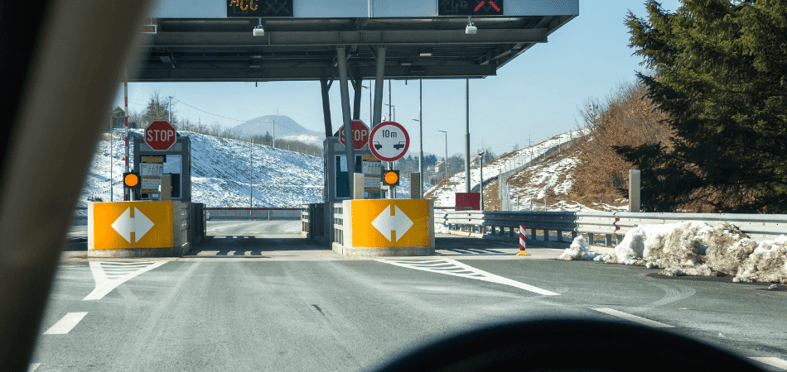Table of Contents
Are you planning to drive on the highways of the United Arab Emirates (UAE)? Then, you must be familiar with toll gates in the country.
Toll gates are checkpoints that charge drivers a fee to use a particular road or bridge. In the UAE, toll gates are present in different emirates, including Dubai (Salik), Abu Dhabi (Darb), and Ras Al Khaimah (Aber).
The toll fees vary depending on the type of vehicle and the time of day, but drivers can expect to pay around AED 4 to AED 6 per toll gate.
As of December 2024, the United Arab Emirates (UAE) employs toll gate systems in major cities like Dubai and Abu Dhabi to manage traffic flow and fund infrastructure development. Here's the latest information:
To pay, the UAE's toll gate system uses electronic toll collection (ETC) technology, which allows drivers to pay tolls automatically without stopping at the toll gate. This blog post will provide you with everything you need to know about toll gates in the UAE, from the types of toll gates to how the toll gate system works and tips for using them.
Types of Toll Gates in the UAE

Dubai: Salik Toll System
Dubai's Salik system utilizes Radio Frequency Identification (RFID) technology to automatically deduct toll fees as vehicles pass under toll gates.
- Toll Fee: AED 4 per crossing.
- Operating Hours: Toll gates operate 24/7.
- Daily Cap: No maximum daily charge; each crossing incurs a fee.
Recent Developments:
On November 24, 2024, two new Salik toll gates became operational:
-
Business Bay Crossing on Al Khail Road: Aims to divert traffic from Jebel Ali towards Sheikh Mohammed bin Zayed Road and Emirates Road, reducing congestion on Al Khail Road by approximately 15%.
-
Al Safa South on Sheikh Zayed Road: Located between Al Meydan Street and Umm Al Sheif Street, this gate is expected to decrease right-turn traffic from Sheikh Zayed Road to Al Meydan Street by 15% and reduce traffic from Al Meydan and Al Safa Streets onto Sheikh Zayed Road by about 42%.
DARB - Abu Dhabi's Toll System
Abu Dhabi toll gates are located on the main highways leading into the city, including Sheikh Zayed Road, Sheikh Khalifa bin Zayed Road, and Al Ain Road. Abu Dhabi's toll gates are part of the city's road network.
Abu Dhabi's DARB toll system operates during peak hours to alleviate traffic congestion.
Peak Hours (Monday to Saturday):- Morning: 7:00 AM to 9:00 AM
- Evening: 5:00 PM to 7:00 PM
Toll Fee: AED 4 per crossing during peak hours.
- Daily Cap: AED 16 per vehicle.
- Exemptions: Certain vehicles, such as ambulances, public buses, and motorcycles, are exempt.
Registration and Payment:
Vehicle owners must register with the respective toll systems:
- Salik (Dubai): Register via the Salik website or authorized channels.
- DARB (Abu Dhabi): Register through the DARB website or the DARB mobile application.
Toll fees are deducted from prepaid accounts linked to vehicle license plates.
Fines for Non-Compliance:
Failure to comply with toll system regulations can result in fines. For instance, in Dubai, passing through a Salik gate without a registered tag may incur fines starting from AED 100 for the first offense, increasing with subsequent violations.
Alternative Routes:
To avoid toll fees, motorists can use alternative routes such as Sheikh Mohammed bin Zayed Road, Emirates Road, and various free bridges and tunnels, depending on the city.
For the most current information, it's advisable to consult the official websites of the Roads and Transport Authority (RTA) in Dubai and the Integrated Transport Centre (ITC) in Abu Dhabi.The toll fee is collected using an electronic tag, In Abu Dhabi, toll fees are collected using an electronic tag system called "Darb." The toll fees are charged based on the distance traveled and the type of vehicle.
As of 2023, the toll fee rates in Abu Dhabi using the Darb system are as follows:
-
AED 4 for light vehicles (cars, taxis, and similar)
-
AED 8 for heavy vehicles (buses and trucks)
These rates apply to each trip taken on the toll roads in Abu Dhabi and are automatically deducted from the balance on the electronic tag. It's important for drivers to ensure that their tag has sufficient balance before using the toll roads, as failure to pay the toll fee can result in fines and penalties.
The benefits of Abu Dhabi toll gates include reducing traffic congestion, encouraging the use of public transportation, and generating revenue for transportation projects.
Aber - Ras Al Khaimah's Toll System
The Ras Al Khaimah toll gate is located on the main highway leading into the city. It uses an electronic toll collection system,
The toll fees for the Aber - Ras Al Khaimah toll system vary depending on the type of vehicle and the time of day. Here are the current toll rates:
-
Light vehicles (2 axles, less than 3.5 tons): AED 4 during peak hours (7:00 am to 9:00 am and 5:00 pm to 7:00 pm) and AED 2 during off-peak hours.
-
Heavy vehicles (2 axles, more than 3.5 tons): AED 8 during peak hours and AED 4 during off-peak hours.
-
Buses and trucks (3 axles or more): AED 16 during peak hours and AED 8 during off-peak hours.
It's worth noting that there are discounts available for registered users of the toll system and that tolls are collected electronically via a prepaid account linked to the vehicle's license plate.
How the Toll Gate System Works in the UAE
In the UAE, toll gates are used to manage the flow of traffic and reduce congestion on major highways.
The toll gate system uses advanced technology to collect tolls from drivers passing through designated toll gates.
The company is responsible for installing and maintaining the toll gates, as well as managing toll collections and payments.
The toll gate system in the UAE uses an electronic toll collection system, which consists of overhead gantries equipped with cameras and sensors.
When a vehicle passes through a toll gate, the cameras and sensors automatically record the vehicle's registration number and other relevant information.
The tolls are calculated based on the distance traveled on the tolled road segment. The toll rates are set by the government and vary depending on the type of vehicle and time of day.
For example, the toll rates for light vehicles are higher during peak traffic hours, while the toll rates for heavy vehicles are generally higher than those for light vehicles.
Toll payments can be made using several methods, including the use of a prepaid toll account or a credit card. Drivers can also make cash payments at toll booths located near the toll gates.
The toll gate system in the UAE also offers a "pay-as-you-go" option, which allows drivers to pay tolls using their mobile phones.
To use the toll gate system in the UAE, drivers must have a compatible electronic tag installed in their vehicles.
The electronic tag is linked to a prepaid toll account, which is automatically deducted every time the vehicle passes through a toll gate.
Overall, the toll gate system in the UAE is an efficient and effective way to manage traffic flow and reduce congestion on major highways.
The use of advanced technology and electronic toll collection systems ensures that tolls are collected accurately and efficiently while providing drivers with convenient and flexible payment options.

Tips for Using Toll Gates in the UAE
Using toll gates in the UAE is relatively easy, but there are a few things to keep in mind to ensure a smooth experience.
To use a toll gate in the UAE, you will need a compatible RFID tag installed in your vehicle. The most common RFID tags in the UAE are the Salik and Darb systems.
These tags can be purchased online or at various retail locations throughout the country.
When you approach a toll gate, make sure that your RFID tag is installed and active. The toll gate will automatically scan your tag and deduct the appropriate toll amount from your account.
If you do not have an RFID tag or if your tag is not active, you will need to pay the toll using a manual payment option.
There are several ways to pay tolls in the UAE. The most common methods are through a pre-paid account or using a credit card.
To set up a pre-paid account, you can visit the Salik or Darb website and follow the instructions. You can also link your credit card to your RFID tag for automatic payments.
If you encounter any issues at a toll gate, such as a malfunctioning RFID tag or an error in the toll amount deducted, you can contact the toll operator's customer service center for assistance. You can find the customer service number on the toll gate or the Salik or Darb website.
In summary, using toll gates in the UAE requires a compatible RFID tag and either a pre-paid account or a linked credit card for automatic payments. If you encounter any issues, contact the toll operator's customer service center for assistance.
FAQS
Q.1 What are the types of toll gates in the UAE?
A. There are three types of toll gates in the UAE: Salik, Darb, and Aber Ras Al Khaimah tool gate.
Q.2 What is Salik?
A. Salik is an electronic toll system that operates in Dubai. It uses an RFID tag on the windshield of a vehicle to deduct the toll amount automatically as the vehicle passes through a toll gate.
Q.3 What is Darb?
A. Darb is a new electronic toll system that operates in Abu Dhabi. It also uses an RFID tag to deduct the toll amount as the vehicle passes through a toll gate.
Q.4 Are there any other toll systems in the UAE?
A. No, there are only these three types of tool systems, Salik, Darb, and Aer tool systems, currently in operation in the UAE.
Q. 5 How do I pay tolls in the UAE?
A. You can pay tolls in the UAE using an RFID tag attached to your vehicle's windshield. The toll amount is automatically deducted from the tag as you pass through the toll gate.
Q.6 How do I get an RFID tag?
A. You can purchase an RFID tag from the toll system operator (Salik). In Dubai, the operator is RTA (Roads and Transport Authority), while in Abu Dhabi, it is the Integrated Transport Centre (ITC).
Q:7 How do I recharge my RFID tag?
A. You can recharge your RFID tag online, through the toll system operator's website or mobile app. You can also recharge it at any of the authorized recharge locations in the UAE.
Q:8 What is the toll rate in the UAE?
A. The toll rate in the UAE varies depending on the type of vehicle and the time of day. The toll rates are published by the toll system operator and can be found on their website (Salik).
Q: 9 Have toll gates been effective in reducing traffic congestion?
A. Yes, toll gates have been effective in reducing traffic congestion in the UAE, especially during peak hours.
Q: 10 What is the environmental impact of toll gates in the UAE?
A. Toll gates have a positive environmental impact by reducing traffic congestion, which leads to lower carbon emissions.
Q: 11 How have toll gates affected the economy of the UAE?
A. Toll gates have had a positive impact on the economy of the UAE by reducing traffic congestion, which leads to increased productivity and reduced transportation costs.
Q:12 When should I avoid using toll roads in the UAE?
A: You should avoid using toll roads during peak hours to avoid paying higher toll rates and to reduce traffic congestion.
Q: 13 Can I use my RFID tag in other vehicles?
A: No, RFID tags are vehicle-specific and cannot be used in other vehicles.
Q: 14 What should I do if my RFID tag is lost or stolen?
A. You should immediately report the loss or theft of your RFID tag to the toll system operator and request a replacement tag.
Q: 15 Can I use my RFID tag in other countries?
A. No, RFID tags issued in the UAE are only valid in the UAE and cannot be used in other countries.
Conclusion
In conclusion, this blog post has provided an overview of toll gates in the UAE, including their purpose, location, and payment system.
We have also discussed the different types of toll gates and exemptions, as well as the fines for non-compliance.
While the tolls may seem like an additional expense for motorists, they help to fund important infrastructure projects that benefit the community as a whole.
By understanding how it works and complying with the regulations, motorists can help to ensure a smoother and more efficient travel experience for everyone on the roads.







